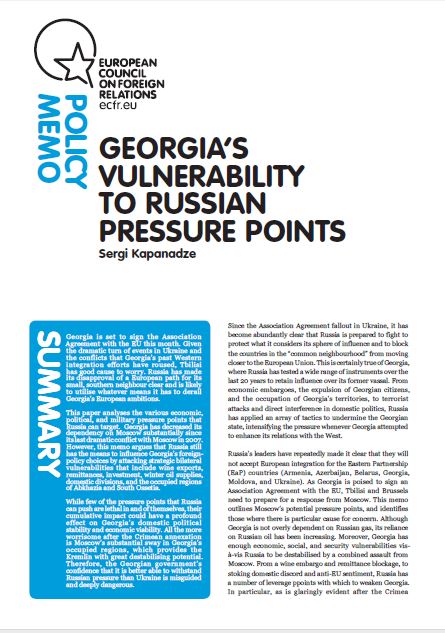Georgia’s vulnerability to Russian pressure points
Exploring potential areas of Russian leverage
Russia’s trump card in hindering Georgia’s rapprochement with the EU lies in the two occupied regions of Abkhazia and South Ossetia, according to this paper. Following Moscow’s annexation of Crimea, author Sergi Kapanadze says Russia may even go as far as to annex South Ossetia. He also suggests Moscow would be likely to target the Geneva talks process on the two disputed regions in order to contest Georgia’s Association Agreement with the EU, due to be signed this week.
He adds “….the Georgian government’s confidence that it is stronger and more able to withstand Russian pressure than Ukraine is misguided and dangerous.”
This paper examines investment, trade, energy and remittances as potential areas of Russian leverage on Georgia and concludes:
- Russia’s current investment in Georgia is small and withdrawal of Russian foreign direct investment does not pose a serious threat to the country unless western FDI were to decrease.
- However, Georgian exports to Russia – particularly wine exports which were banned by Moscow during the political tension of 2006 – are now higher than at any point since Georgian independence and growing rapidly. Such exports would be vulnerable to any deterioration in political relations with Russia.
- Although Georgia has been a net electricity exporter to Russia since 2007 and its dependence on Russian gas is falling, there has been an increasing dependence on imports of Russian oil.
- With remittances from Georgian migrants in Russia growing, a remittance ban would be a potent economic weapon although it would be difficult to implement. However during the political tension of 2006 Russia expelled ethnic Georgian workers en masse.
Sergi Kapanadze also notes that, inside Georgia, Russia is likely to fuel opposition to closer European integration through support for two relatively marginal political parties, the conservative Georgian Orthodox Church, anti-EU interest groups and Georgia’s pro-Armenian separatist movement.
The author says “Georgia needs to acknowledge its vulnerabilities and warn its EU and NATO allies of the threat, so that when the pressure mounts they are not caught on their heels – as they were in Ukraine.”
Prof Kapanadze concludes that the options Russia may use to deter Georgia’s EU integration – and Tbilisi’s reaction to them – could depend on developments in Ukraine because the EU’s economic interest in Russia’s Eastern Partnership area will be determined by its future relationship with Kiev.
The European Council on Foreign Relations does not take collective positions. ECFR publications only represent the views of their individual authors.



